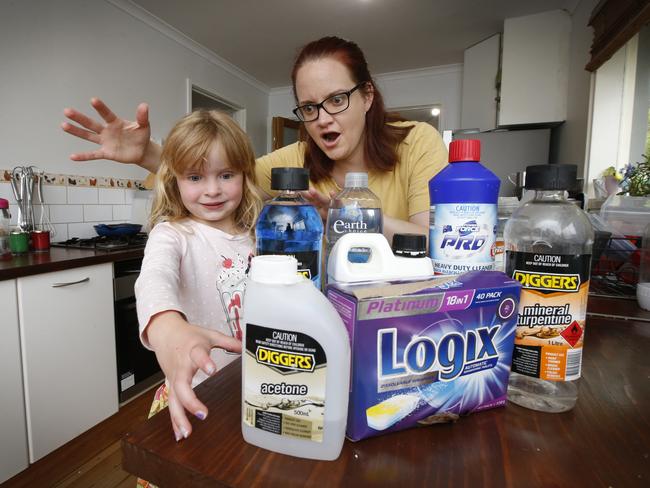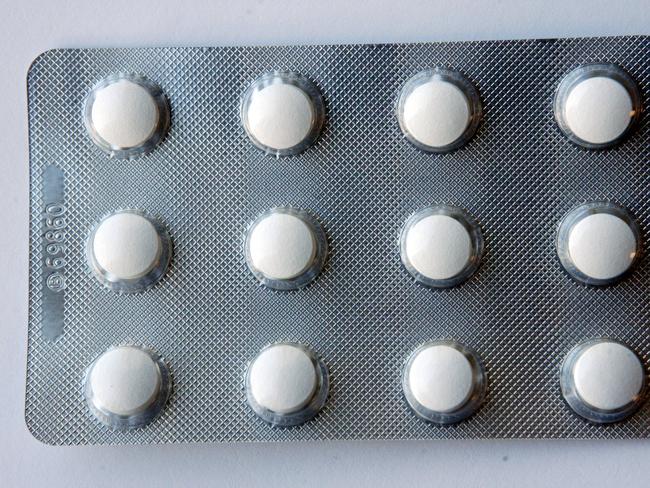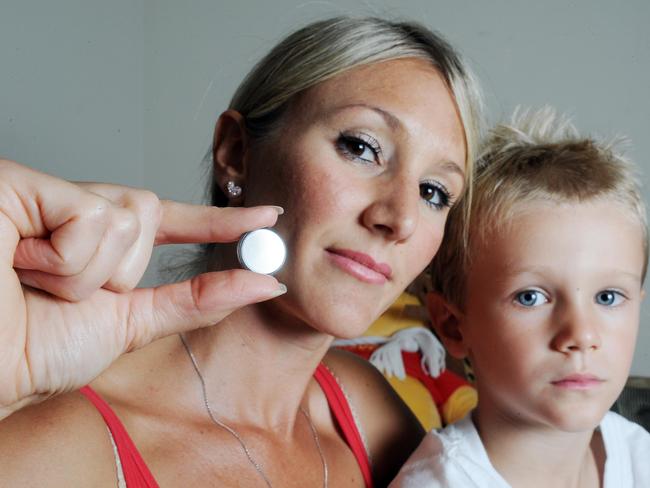Household items poisoning Victorian kids
Victorian parents are being warned common household products pose a serious poisoning threat these summer holidays. Here are the top dangers at home.
News
Don't miss out on the headlines from News. Followed categories will be added to My News.
Victorian parents are being warned common household products pose a serious poisoning threat these summer holidays.
More than 7000 cases of actual or suspected exposures to poisons involving children up to 19 years old were recorded across the December 1 to January 31 period in the state over the past two years.
The figures, from the Victorian Poisons Information Centre, show more than 480 of these pertained to the common headache-busting drug paracetamol, followed by ibuprofen (286), detergents (288), plants (264), and harsh cleaning products such as laundry powder and oven cleaner (257).
A further 188 cases related to topical antiseptics, while 178 concerned dessicant — the small packets containing silica gel which are found in some product packages and absorb moisture.
Vitamins (175 cases), toilet bowl cleaner (126) and glow sticks (123) rounded off the top 10 list.
The Centre’s Medical Director, Associate Professor Shaun Greene, said parents should not make their child vomit if they have ingested a toxin, explaining this was archaic advice that did more harm than good.
“It puts the child at risk of the toxin going into their lungs or causing other damage,” Associate Professor Greene said.
Instead, he said parents should call the Centre which could advise on the best course of action.
“If the child has taken a substance that we think may cause severe damage to the gastrointestinal tract, essentially the advice is to take the child to hospital,” he said.
The calls fielded by the Centre include both unintentional exposure and deliberate exposure.
Generally, children under five years old would find themselves in trouble accidentally through exploring the environment, while the incidence of poisoning dropped for those aged between five and 12, Associate Prof Greene said.

Through the remainder of the teenage years, the Centre saw more cases of deliberate self-poisoning, particularly through painkillers such as paracetamol and ibuprofen.
On the whole, however, most of the toxins listed were not life-threatening through accidental exposure, with only a “minority” of children being referred to hospital.
“Most exposures can be managed in the home … maybe having a little sip of water and washing the mouth out and with the expectation that if they become unwell that mum or dad will take them to hospital,” he said.
However, some were particularly dangerous.
Of the toxins listed, cleaning products such as oven cleaners and laundry powders were the biggest concern because they are “incredibly corrosive”, Associate Prof Greene said.
Dr Osanda Wijeratne, deputy chief medical officer at Healthdirect Australia, said in order to lower the risk of poisoning at the home, products like cleaners and medications should be kept high up in cupboards, and fitted with a child-safety lock or clip.

Dr Wijerante said button batteries, which can cause-life threatening injuries and even death if swallowed, should be disposed of immediately when replaced, and when in use, secured to the greatest extent possible.
“Lots of household devices are powered by button batteries. It’s important to make sure that if you’re replacing them to make sure they’re not left lying around,” he said.
“When in use, make sure the battery compartment is shut … you can also use a strong bit of household tape to secure the compartment closed”.
He said adults sometimes found themselves in trouble after accidentally taking double doses, or mistaking another family member’s prescription medication as their own.

A way to avoid this if taking multiple medications was to ask a pharmacist to fill a Webster-pak, which sets out an individual’s weekly medication for them, he said.
Pakenham mother-of-two Emily Studd said her two young girls — Savannah, 12, and Sophia, five — have fortunately avoided accidents with household poisons because she took steps to ensure the common, yet dangerous products were out of their reach when they were younger.
“The cleaners are stored under the sink and the medicines are in a high cupboard in the bathroom and fridge,” Ms Studd said.
“My children are old enough to understand now, but we also don’t use many overly toxic chemicals or cleaners.
“Children can be incredibly quick and very clever at finding things they shouldn’t.”
For free poisons advice 24 hours a day, seven days a week, call the Poisons Information Centre on 13 11 26
TIPS TO PREVENT AND HANDLE POISONINGS
– Do not induce vomiting if a substance has been ingested.
– In the event of an exposure to the skin or eyes, flush with water for 10 minutes.
– Keep items like cleaners and medications up high in cupboards away from children.
– Do not decant cleaners into other bottles.
– Keep track of when you have taken your medications to avoid double dosing.
– Call the Poisons Information Centre for free advice, 24 hours a day, seven days a week on 13 11 26
Source: Genevieve Adamo, Senior Poisons Specialist, NSW Poisons Information Centre; Carol Wylie, Manager, QLD Poisons Information Centre; Associate Professor Shaun Greene, Medical Director, Victorian Poisons Information Centre




